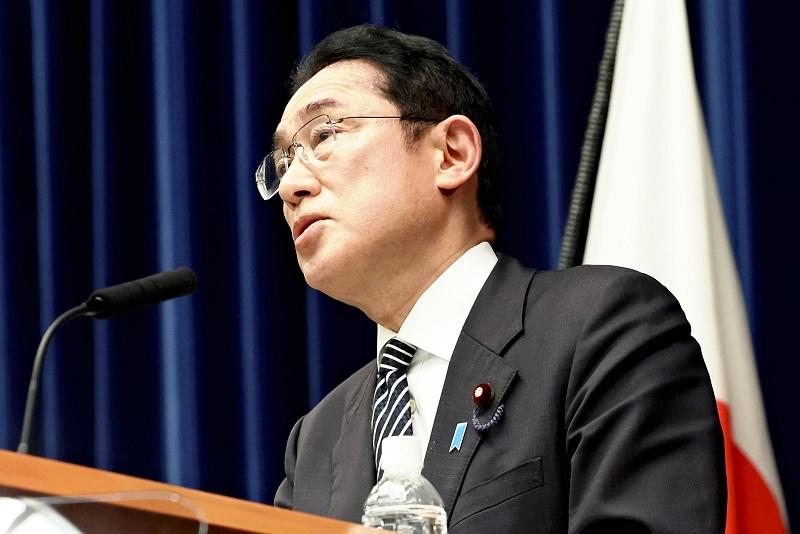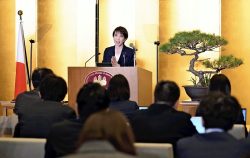Kishida unveils ¥6.2 trillion emergency economic package to cope with soaring prices

Prime Minister Fumio Kishida speaks at a press conference in Tokyo on Tuesday.
18:21 JST, April 27, 2022
Prime Minister Fumio Kishida announced a ¥6.2 trillion emergency economic package Tuesday aimed at mitigating the impact of soaring prices of crude oil and other commodities following Russia’s invasion of Ukraine.
With ¥6.2 trillion to be allocated from government funds, the overall scale of the measures will total ¥13.2 trillion, including investment from the private sector and other sources.
The government will submit a supplementary budget for fiscal 2022 to the current Diet session to fund part of the package.
“All out efforts must be made to prevent the surge in the prices of oil and other goods from hampering the social and economic recovery from the coronavirus crisis,” Kishida said at a press conference Tuesday.
“A two-step approach will be taken to ensure thorough economic and fiscal management,” he said, explaining that the government would formulate a second round of economic stimulus measures after the House of Councillors election, based on his “new capitalism” policy action plan, which is set to be compiled by June.
In the first round of measures, ¥1.5 trillion will be allocated to address the rising cost of crude oil. To curb the surge in prices, the government will increase subsidies for wholesalers from the current cap of ¥25 per liter to ¥35 per liter.
The subsidy period is to be extended until the end of September and the targeted price of gasoline will be lowered from the current ¥172 per liter to ¥168 per liter.
“Even if the price of gasoline was to exceed ¥200 per liter, the market price will be kept at around ¥168 per liter for the time being,” Kishida said.
The emergency measures also include a handout of ¥50,000 per child for low-income families and ¥100,000 for households that are exempt from paying residential tax from this fiscal year.
The fiscal 2022 supplementary budget is set at ¥2.7 trillion, of which ¥1.5 trillion will be used to cover reserve funds.
Meanwhile, the government will rename the “reserve fund for measures to cope with the novel coronavirus” to the “reserve fund for measures to cope with the novel coronavirus, and the soaring prices of crude oil and other goods,” thus expanding its use.
It is unusual for the government to compile a supplementary budget primarily to increase reserve funds.
Regarding the sudden depreciation of the yen, Kishida said “It is not desirable for the exchange rate to fluctuate too rapidly.” On the Bank of Japan’s policy of achieving a 2% inflation target, the prime minister said, “We expect continued efforts to be made toward that end.”
Political compromises between the ruling Liberal Democratic Party and its coalition partner Komeito are evident in the government’s emergency economic package.
The LDP’s basic policy had been to dip into the reserve funds of the fiscal 2022 budget, but Komeito insisted on compiling a supplementary budget in the current Diet session.
The method of increasing the reserve funds has been called into question even among ruling party members.
“Whatever happens, we’ll take every possible precaution to protect people’s livelihoods,” Kishida said at the press conference, emphasizing the significance of the proposed supplementary budget.
However, the prime minister and LDP executives initially had different plans.
On March 29, Kishida told the party leadership to compile an emergency economic package by the end of April, envisaging a plan of utilizing reserve funds totaling ¥5.5 trillion in the fiscal 2022 budget, with a supplementary budget to be drawn up after the upper house election.
Kishida thought it would be unwise to hold budget committee meetings before the upper house election as it would give opposition parties an opportunity to pursue the matter in the Diet.
However, Komeito leader Natsuo Yamaguchi had repeatedly called for having a supplementary budget compiled in the current Diet session.
The prevailing view within the government and the LDP was that “Komeito would give way in the end.” The fact that a senior Finance Ministry official was telling LDP leadership that a supplementary budget would be unnecessary added to the optimism.
But Komeito — a party that attaches importance to the interest of ordinary citizens — refused to budge, making the task of coordinating views between the two parties a challenge.
“There is no compromise in sight,” an official close to Kishida lamented at one point.
In the end, Kishida held direct talks with Yamaguchi on April 20, following which, the prime minister told Chief Cabinet Secretary Hirokazu Matsuno and others that “Komeito’s intentions are quite firm,” and instructed LDP Secretary General Toshimitsu Motegi to work out a compromise plan.
The LDP even approached Komeito behind the scenes about whether it would agree with a supplementary budget that was made up only of an increase in the reserve funds. But Komeito rejected that proposal, too.
Both parties eventually reached a compromise over a supplementary budget that includes a reserve fund of ¥1.5 trillion and ¥1.2 trillion for measures to cope with the rise in the prices of crude oil and other goods.
As the Cabinet can decide how to make use of the reserve funds without the Diet’s approval, there has been strong criticism that such measures run counter to “fiscal democracy” if used too often.
Kishida said Tuesday that the reserve fund is meant as a measure to deal with the coronavirus and the rise in the prices of crude oil and other goods. “The use of the funds is limited and will be carefully explained in consultation with the Diet,” he said.
However, there are concerns even within the LDP that the reserve fund is being used as a lucky hammer.
Tatsuo Fukuda, chairman of the party’s General Council, said at a press conference, “The method of covering a shortage [of reserve funds] with a supplementary budget should not be taken frequently.”
Top Articles in Politics
-

LDP Wins Historic Landslide Victory
-

LDP Wins Landslide Victory, Secures Single-party Majority; Ruling Coalition with JIP Poised to Secure Over 300 seats (UPDATE 1)
-

CRA Leadership Election Will Center on Party Rebuilding; Lower House Defeat Leaves Divisions among Former CDPJ, Komeito Members
-

Japan Tourism Agency Calls for Strengthening Measures Against Overtourism
-

Voters Using AI to Choose Candidates in Japan’s Upcoming General Election; ChatGPT, Other AI Services Found Providing Incorrect Information
JN ACCESS RANKING
-

Japan Institute to Use Domestic Commercial Optical Lattice Clock to Set Japan Standard Time
-

Israeli Ambassador to Japan Speaks about Japan’s Role in the Reconstruction of Gaza
-

Man Infected with Measles May Have Come in Contact with Many People in Tokyo, Went to Store, Restaurant Around When Symptoms Emerged
-

Prudential Life Insurance Plans to Fully Compensate for Damages Caused by Fraudulent Actions Without Waiting for Third-Party Committee Review
-

Woman with Measles Visited Hospital in Tokyo Multiple Times Before Being Diagnosed with Disease






















